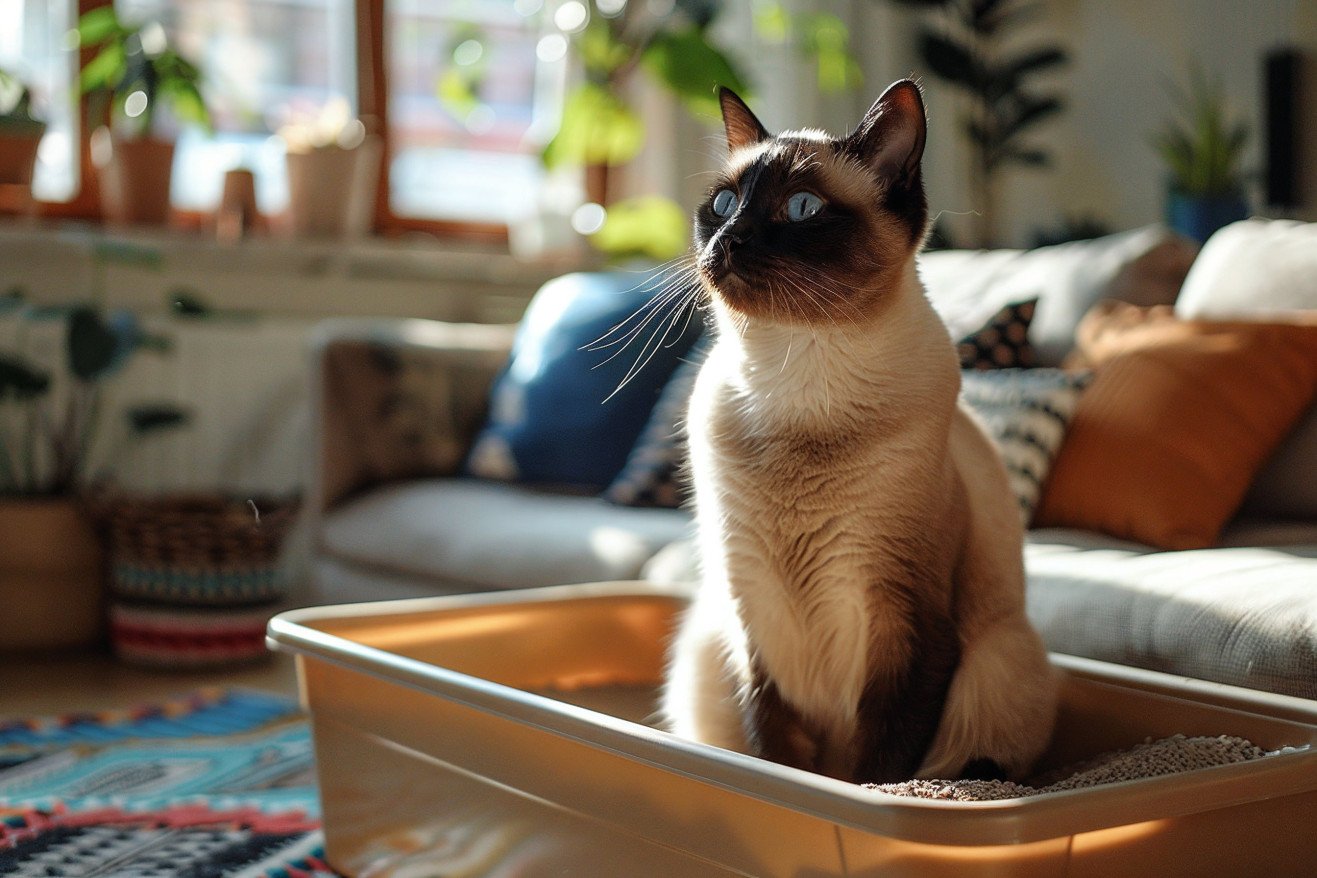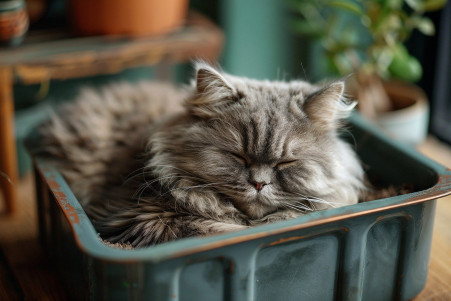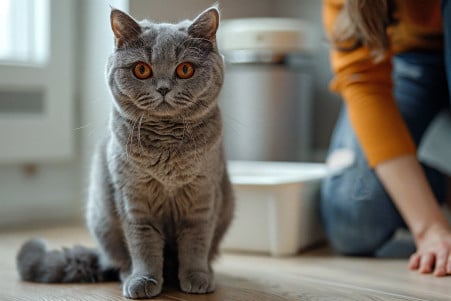Why Do Cats Sit in the Litter Box? Unraveling This Puzzling Behavior
3 April 2024 • Updated 2 April 2024

If you’ve ever walked in on your cat in their litter box, only to find them sitting there, seemingly doing nothing, you’re not alone. It turns out that this strange behavior is actually pretty common among cats, who often think of their litter boxes as a place to hang out, not just a place to go to the bathroom. According to experts, cats sit in the litter box because it provides a sense of security, warmth, and the familiar smells can be comforting to them.
Thankfully, animal behaviorists and veterinarians have done a lot of research on this strange behavior. In this article, we’ll explore the results of ethological observations in home environments and cat psychology research to explain why cats sit in their litter boxes. This investigation will help you better understand your cat and figure out when this behavior may be a sign of an underlying medical issue and when it’s just a quirky habit.
Why do cats sit in the litter box?
Medical Causes of Litter Box Loafing
Although cats loafing in their litter boxes may seem like a harmless behavior, it can be a sign of several medical issues that need to be addressed by a vet right away. As noted by Cats.com, increased thirst, frequent urination, straining, and passing only small amounts of urine can be symptoms of kidney disease, diabetes, urinary tract infections (UTIs), or life-threatening urinary blockages. Gastrointestinal issues like constipation or diarrhea can also lead to loafing in the litter box.
Feline lower urinary tract disease (FLUTD), which includes conditions like feline idiopathic cystitis, is another possible cause of spending too much time in the litter box, especially in younger male cats, according to Rover.com. Other signs of a medical issue include bloody urine, inappropriate elimination, difficulty or pain during urination, and overgrooming of the genital area.
If your cat is experiencing any of these other symptoms in addition to loafing in the litter box, it's important to take them to the vet as soon as possible. A vet can provide a proper diagnosis and treatment plan, which may include antibiotics for a UTI, dietary changes for crystalluria, anti-inflammatories, or even surgery for bladder stones. Failing to address these symptoms can lead to more serious health problems and unnecessary pain for your cat.
Behavioral and Environmental Factors
Aside from medical issues, a cat's desire to sit in their litter box can be caused by behavioral and environmental factors. Per Cats.com, stress, anxiety, or changes in the home environment, like the addition of a new pet or person, can lead a cat to seek solace in the comfort and safety of the litter box.
Territorial marking, play, or simply using the litter box as a place to hide can also play a role. According to GreenMatters.com, cats may sit in the litter box longer to re-mark their territory, especially if they're having issues with other cats in the home.
Kittens, in particular, may need time to learn how to use the litter box properly and may need to be trained with patience and positive reinforcement, as Purina points out. Underlying stress or environmental changes can be addressed to help alleviate these behavioral litter box problems.
While some litter box sitting may be a funny quirk, if a cat avoids the litter box for an extended period of time, it can lead to serious medical and behavioral problems that need to be dealt with immediately.
Long-Term Effects of Litter Box Avoidance and When to Get Help
If a cat refuses to use the litter box over the long term, it can have serious health and behavioral impacts. For example, holding urine or feces for long periods can lead to urinary tract infections, kidney issues, and other medical problems, according to Dr. Stephanie Globerman of Paws Whiskers & Claws, The Feline Hospital. In addition to these health issues, inappropriate elimination can lead to stress for the cat and the human family, says the ASPCA.
While some instances of litter box avoidance may be short-term, long-term problems may require professional help from a veterinarian or animal behaviorist. As noted by Hill's Pet, getting help in a timely manner can help prevent additional health issues and help to identify and treat any root causes before the behavior becomes a habit. Failing to address these issues can lead to more serious and more challenging conditions down the road.
Retraining Your Cat: How to Get Your Cat to Use the Litter Box
If your cat is currently avoiding the litter box, retraining can be used to help the cat relearn how to use the box. According to Companion Protect, it’s important to make sure that the litter box is set up in a way that is most appealing to the cat, including the right size, type of litter, and location. In addition, any changes to the litter box should be made gradually to give the cat time to adjust.
Positive reinforcement, such as treats or praise, can be used to help the cat relearn how to use the litter box consistently, according to wikiHow. In more extreme cases, professional help from a veterinarian or animal behaviorist may be needed to help the cat relearn how to use the litter box and to help with any underlying anxiety, including medication, according to Purr Partners.
It’s important to make sure that the litter box is kept clean and inviting to help the cat relearn how to use the litter box and to prevent future litter box issues.
Keeping the Litter Box Clean and Welcoming
Keeping the litter box clean and fresh is essential to ensure your cat continues to use it. As the Humane Society of the United States explains, cats like litters that are sand-like and fine-grained, and a light dusting of baking soda on the bottom can help absorb smells. It's important to scoop out waste daily and change the litter completely every 1-2 weeks for clumping litters.
When you change the litter, it's also important to wash the litter box thoroughly with mild soap and hot water, as TIME Stamped notes. The Spruce Pets recommends making sure there are enough litter boxes for the number of cats in the home, plus one extra, and using liners, mats, or high-sided boxes to keep odors and tracking to a minimum.
Keeping the litter box clean and welcoming is important to help ensure your cat continues to use it and doesn't develop litter box problems in the future. By doing so, you can make sure your cat is happy and healthy and continues to use the litter box as they should.
Conclusion: Understanding and Addressing Feline Litter Box Behavior
Cats sitting or lounging in their litter boxes is a common behavior with various potential causes. Medical issues, stress, environmental changes, and territorial marking can all contribute to this habit. Prolonged litter box avoidance can lead to serious health and behavioral consequences for cats.
Proper litter box setup, maintenance, and retraining techniques can help encourage consistent litter box use. Seeking professional help from a veterinarian or behaviorist is recommended for persistent or severe litter box issues.


